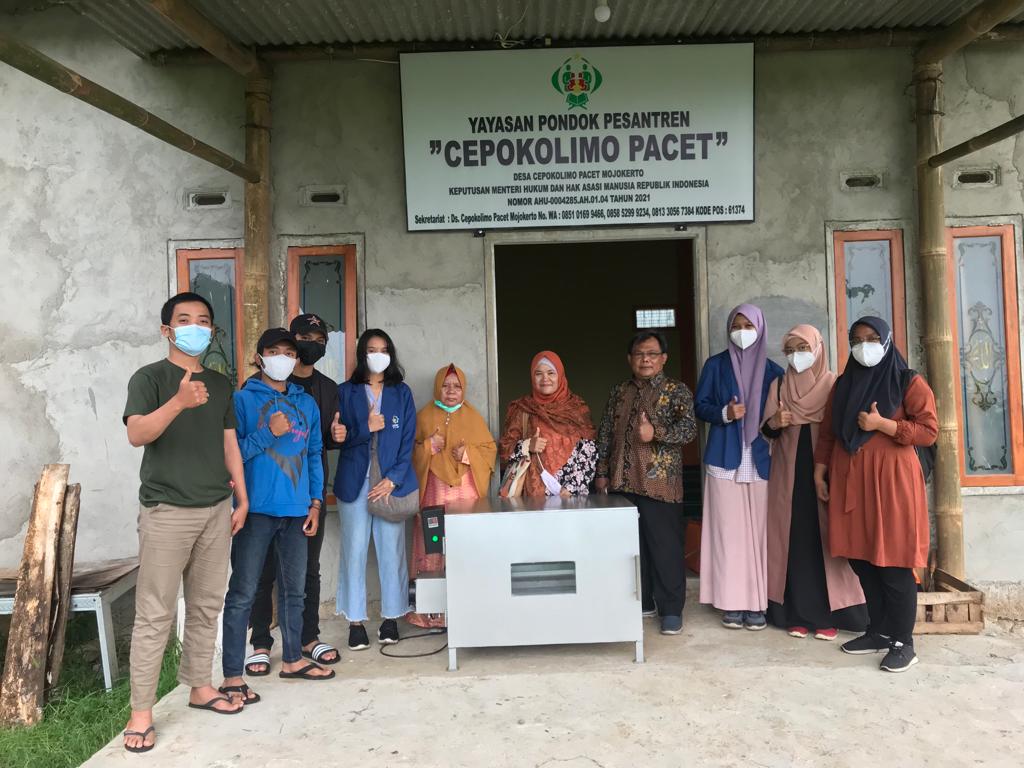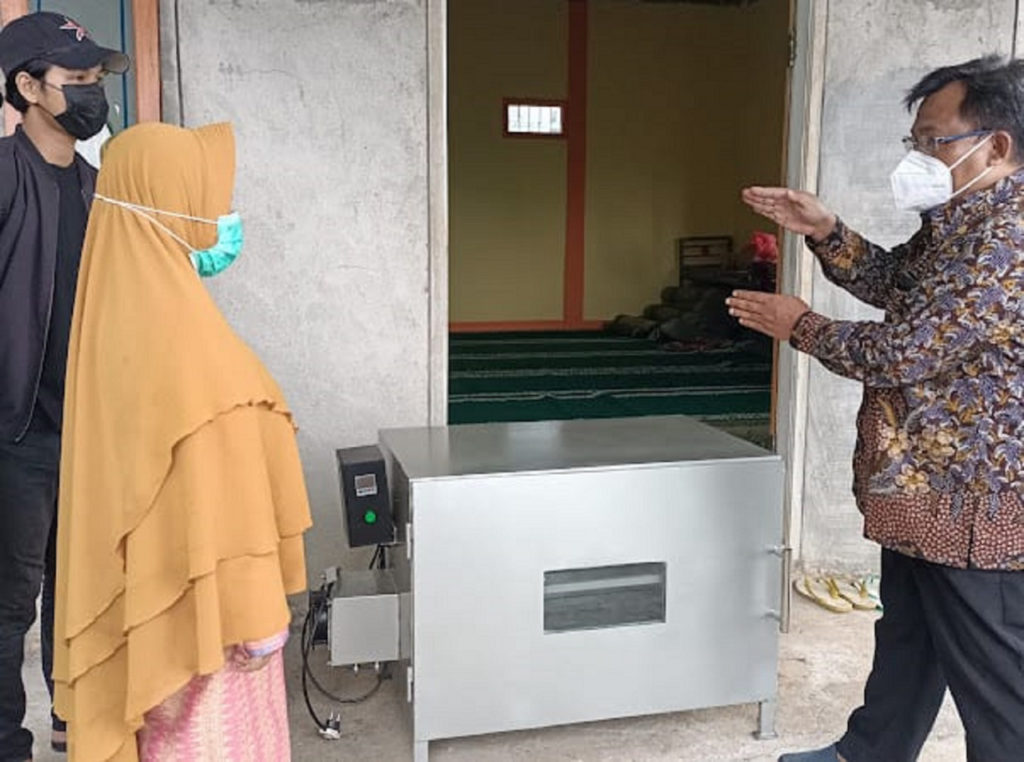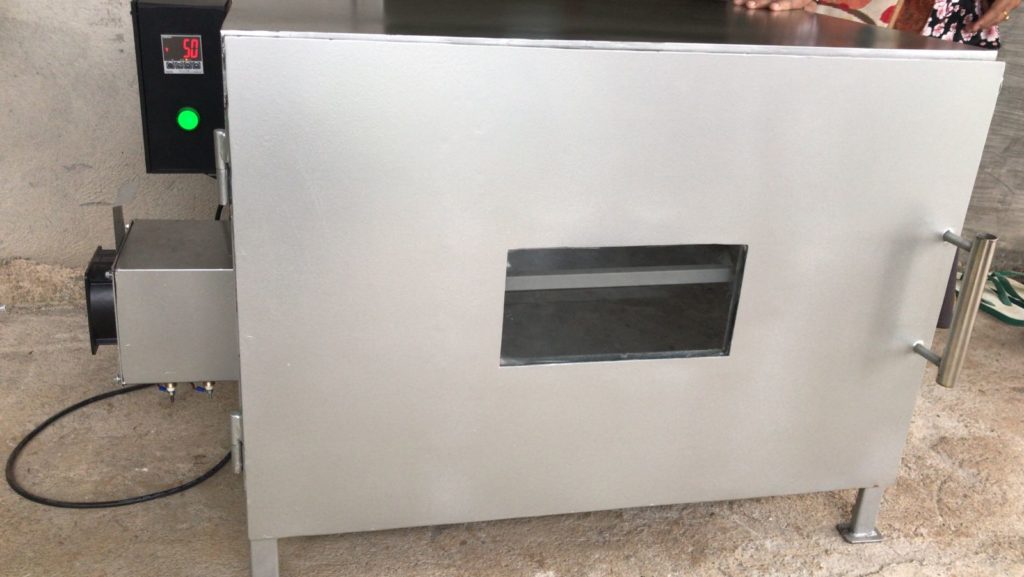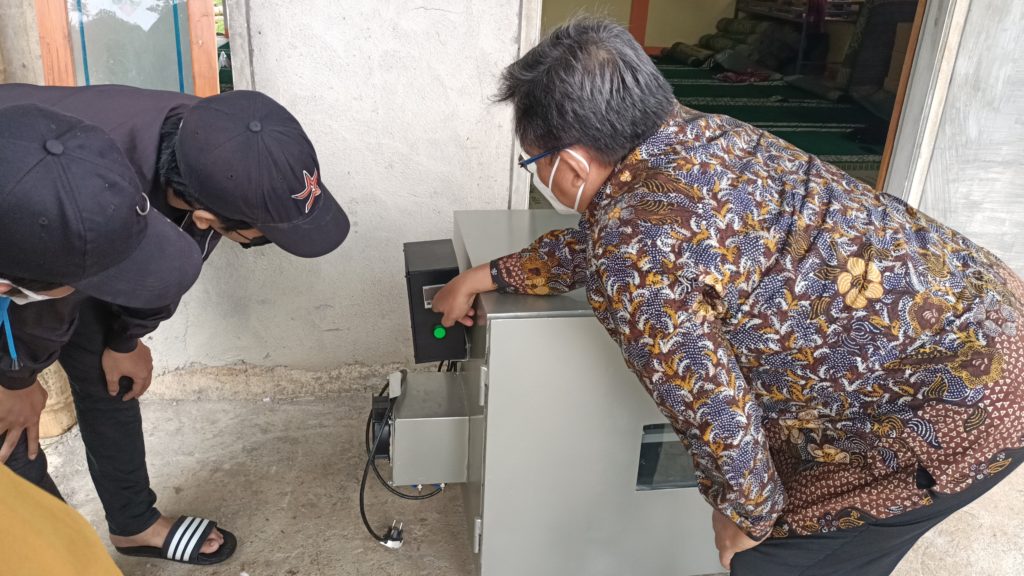ITS KKN Abmas Creates an Electric Fruit Heater

The handover of this ITS KKN Abmas team’s electric fruit heater to the Cepokolimo Village, Pacet
ITS Campus, ITS News – Because of the ongoing pandemic, abundant fruit products sales has decreased drastically in Cepokolimo Village, Pacet, Mojokerto. Responding this problem, the KKN Abmas team or the Student Study Service team of Institut Teknologi Sepuluh Nopember (ITS) created an innovative electric heater to increase the village’s fruit sales.
The ITS KKN Abmas supervisor, Prof. Drs MSc PhD Basuki Widodo, said that this electrical heating machine is beneficial for villagers by reducing food waste problems. Notably, they can use this innovative machine to dry the fruit flesh produced by residents. “Then they will process fruit products into a new type of food, such as a fruit leather,” he explained.

Prof. Drs Basuki Widodo MSc PhD (right) explains how the team’s electric fruit heater works for the villagers.
Fruit Leather shape is like a thin sheet with a plastic-like and chewy texture. Besides, this fruit leather has a sweet taste without losing the characteristic flavor of the original fruit. This innovation aims to increase shelf life and to increase processed food variety. “That way, Cepokolimo Village can increase the selling value of their fruit,” said the professor at the Mathematics Department.

The ITS KKN Abmas team’s electric fruit heating machine can process fruits into fruit leather.
Based on the statement from this doctoral alumnus of Leeds University, England, the electric heater resembles an oven with a large enough capacity. This machine is capable of loading about 15 pans. Its dimensions are 90 cm long, 60 cm wide, and 75 cm high. “We have created this machine within three weeks; also, it took four days to design,” said Basuki in more detail.
This electric heater has the concept of a tubular heating element by using coils of wire binding coils. The wire is inserted into the pipe and poured with the insulating powder. Thus, this design can transmit heat and become a good insulator. Therefore electric current does not penetrate and flow in the wrapping pipe. The pipe material used to wrap the tubular heater is 30-millimeter stainless steel.
In addition, the ITS Abmas KKN team also uses an electric thermostat that functions to maintain a constant temperature. The thermostat will cut off power if the temperature generated by the tubular heater reaches more than 80 degrees Celsius. If the temperature supplied by the tubular heater decreases, then the power will turn on automatically. “This machine requires 600 watts of power and takes about 12 hours,” explained Basuki

Prof. Drs Basuki Widodo MSc PhD (right) demonstrating an electric heater created by the ITS KKN Abmas team.
In the end, Basuki expressed his hope regarding creating this electric fruit heating machine. He hopes that the people of Cepokolimo Village and other fruit-producing villages can improve the quality of their fruit processing. “At the same time, it can reduce the occurrence of food waste in the village environment,” he concluded. (nadh/ITS Public Relations)
Reporter: Bima Surya Samudra
Redaktur: Najla Lailin Nikmah
Related News
-
ITS Wins 2024 Project Implementation Award for Commitment to Gender Implementation
ITS Campus, ITS News —Not only technology-oriented, Institut Teknologi Sepuluh Nopember (ITS) also show its commitment to support gender
November 19, 2021 11:11 -
ITS Professor Researched the Role of Human Integration in Sustainable Architecture
ITS Campus, ITS News –The developing era has an impact on many aspects of life, including in the field
November 19, 2021 11:11 -
ITS Sends Off Group for Joint Homecoming to 64 Destination Areas
ITS Campus, ITS News — Approaching Eid al-Fitr, the Sepuluh Nopember Institute of Technology (ITS) is once again facilitating academics who want
November 19, 2021 11:11 -
ITS Expert: IHSG Decline Has Significant Impact on Indonesian Economy
ITS Campus, ITS News — The decline in the Composite Stock Price Index (IHSG) by five percent on March 18,
November 19, 2021 11:11
